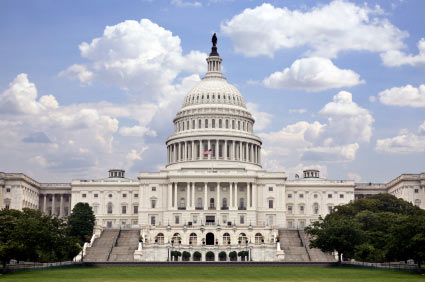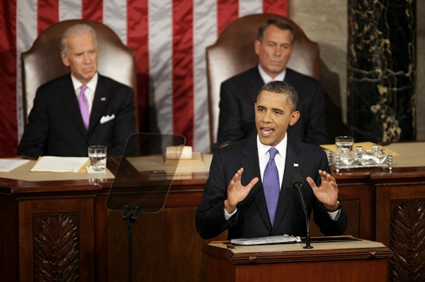When House Speaker John Boehner said on Thursday that “tax increases destroy jobs” and are not a “viable option” for the Joint Select Committee tasked with reducing the budget deficit, he was probably unaware that a major business lobbyist and a high-profile conservative economist had admitted a day earlier that the last significant tax increases did not hurt the economy.
Bill Rys of the National Federation of Independent  Businesses (NFIB) tried to explain to the Senate Finance Committee on Wednesday his view that tax increases today would hurt the economy even though the economy thrived after the 1993 tax hikes enacted under President Clinton.
Businesses (NFIB) tried to explain to the Senate Finance Committee on Wednesday his view that tax increases today would hurt the economy even though the economy thrived after the 1993 tax hikes enacted under President Clinton.
“In the 1990s,” he said, “we had a dot.com boom, we had Y2K, a lot of money being spent there, so we had much stronger economic winds pushing, pushing, which we don’t have right now.”
The obvious circularity of the argument seemed to go unnoticed by members of the committee. Rys said, in essence, that the tax increases of the 1990s did not prevent economic growth because we had economic growth in the 1990s.
Stephen Entin of the conservative Institute for Research on the Economics of Taxation, made a similar comment to explain why the Clinton tax increases did not cause the economic stagnation that he predicts would result from tax increases today.
“The Clinton marginal tax rate increases were fairly modest and we were coming out of a downturn. The growth was going to look good anyway.”
Most of the tax increases proposed today, which Entin believes will lead to a reduction in GDP, actually would just allow some rates to revert to the Clinton-era rates, so it’s surprising that he calls the Clinton tax increases “fairly modest.”
Even more surprising is his comment that the Clinton tax increases were not damaging because “we were coming out of a downturn.” No one asked the obvious follow-up question: If tax increases did not prevent a recovery in the 1990s, why would they prevent a recovery today?
 Entin went on to say that what also allowed the economy to grow in the 1990s was the capital gains cut signed into law by President Clinton in 1997, which reduced the top capital gains rate to 20 percent.
Entin went on to say that what also allowed the economy to grow in the 1990s was the capital gains cut signed into law by President Clinton in 1997, which reduced the top capital gains rate to 20 percent.
“Please remember that he did sign a capital gains tax reduction and a lot of the growth in that decade was due to that reduction in the cost of capital. It dwarfed the effect of raising the marginal rates.”
The capital gains cut did not go into effect until 1998 so it’s interesting that Entin thinks that accounted for “a lot of the growth in that decade,” meaning the 1990s.
It’s also noteworthy that allowing the Bush tax cuts to expire would allow the top capital gains tax rate to simply revert to 20 percent, the rate that Clinton enacted and which Entin seems to think was conducive to growth.
A close look at the numbers demonstrates that there is no policy basis for allowing capital gains income to be taxed at lower rates than ordinary income. Advocates of tax cuts for investment income have for years argued that the revenue collected from taxes on capital gains will actually rise in response to a capital gains tax cut, but the data does not bear this out. For example, capital gains tax revenue was lower in the years following Bush’s 2003 capital gains tax cut than during the Clinton years. This revenue fluctuates with the economy and does not seem correlated with tax rates.
Of course, we could give Rys and Entin the benefit of the doubt and assume they really mean that economic growth would have been even higher during the 1990s if President Clinton had not raised tax rates. But even that argument is entirely unsupported by the data. A 2008 report from the Center for American Progress and the Economic Policy Institute compares the economic recoveries following the major tax changes enacted during the administrations of Presidents Ronald Reagan, Bill Clinton, and George W. Bush. The report illustrates that the recovery under Clinton was far stronger, despite the tax increases that he enacted, than the recoveries during the other two administrations.
Rys and Entin have both long advocated for making permanent all of the Bush tax cuts and enacting additional tax reductions. In 2010 CTJ wrote a response to arguments made by Rys and NFIB concerning the impacts of taxes on small businesses. In 2009 CTJ wrote a response to a report from Entin claiming that elimination of the estate tax would actually increase revenue.
 grown increasingly skeptical about the effectiveness of business tax breaks in encouraging economic development. But the bad news is that during an ongoing special legislative session, some lawmakers have been eager to enact massive new tax breaks for a proposed cargo hub, optimistically dubbed “Aerotropolis,” to be located at the St. Louis airport, which is meant to lure overseas cargo shippers to Missouri.
grown increasingly skeptical about the effectiveness of business tax breaks in encouraging economic development. But the bad news is that during an ongoing special legislative session, some lawmakers have been eager to enact massive new tax breaks for a proposed cargo hub, optimistically dubbed “Aerotropolis,” to be located at the St. Louis airport, which is meant to lure overseas cargo shippers to Missouri. This one-page fact sheet explains why Congress should enact a “revenue-positive” corporate tax reform and addresses the most frequently asked questions about corporate taxes.
This one-page fact sheet explains why Congress should enact a “revenue-positive” corporate tax reform and addresses the most frequently asked questions about corporate taxes.



 The American Jobs Act proposed by President Barack Obama includes provisions to offset its estimated $447 billion cost by taxing wealthy individuals, investment fund managers, and profitable companies, mainly oil and gas companies. The vast majority of the revenue would be raised by the provision to limit the value of tax deductions and exclusions for high-income people. This provision would impact 2.3 percent of taxpayers, and 75 percent of the resulting tax increase would be paid by those among the richest one percent of taxpayers.
The American Jobs Act proposed by President Barack Obama includes provisions to offset its estimated $447 billion cost by taxing wealthy individuals, investment fund managers, and profitable companies, mainly oil and gas companies. The vast majority of the revenue would be raised by the provision to limit the value of tax deductions and exclusions for high-income people. This provision would impact 2.3 percent of taxpayers, and 75 percent of the resulting tax increase would be paid by those among the richest one percent of taxpayers. Congress has several options for raising revenue by reducing or eliminating regressive tax subsidies that benefit profitable businesses and wealthy investors. This report describes several of these options, and includes revenue estimates from the non-partisan Joint Committee on Taxation (JCT) and Congressional Budget Office (CBO).
Congress has several options for raising revenue by reducing or eliminating regressive tax subsidies that benefit profitable businesses and wealthy investors. This report describes several of these options, and includes revenue estimates from the non-partisan Joint Committee on Taxation (JCT) and Congressional Budget Office (CBO). corporate tax reform plan along with his deficit reduction proposals. Previous statements from the administration indicate that the corporate tax reform plan would be
corporate tax reform plan along with his deficit reduction proposals. Previous statements from the administration indicate that the corporate tax reform plan would be  Businesses (NFIB) tried to explain to the
Businesses (NFIB) tried to explain to the  Entin went on to say that what also allowed the economy to grow in the 1990s was the capital gains cut signed into law by President Clinton in 1997, which reduced the top capital gains rate to 20 percent.
Entin went on to say that what also allowed the economy to grow in the 1990s was the capital gains cut signed into law by President Clinton in 1997, which reduced the top capital gains rate to 20 percent. candidate David Williams released the outline of his
candidate David Williams released the outline of his  The Institute on Taxation and Economic Policy
The Institute on Taxation and Economic Policy
